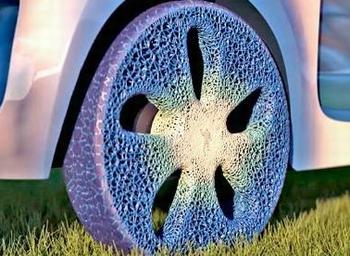
CLERMONT-FERRAND, France, September 24, 2018 (ENS) – To the French tire manufacturer Michelin, Ambition 2048 means a whole new strategy of using sustainable materials in tire manufacturing and recycling. It means that in the year 2048 Michelin plans to manufacture its tires using 80 percent sustainable materials, and that 100 percent of those tires will be recycled.
Headquartered in Clermont-Ferrand, Michelin is present in 170 of the world’s 197 countries, has 111,700 employees and operates 68 production facilities in 17 countries, which collectively produced 187 million tires in 2016.
The World Business Council for Sustainable Development estimates that in 2018 there will be one billion end-of-life tires generated in the world – around 25 million tons.
Today the worldwide recovery rate for tires is 70 percent and the recycling rate is 50 percent. The remaining 20 percent are transformed into energy. By comparison, 14 percent of plastic packaging or containers are recovered each year.

To accomplish Ambition 2048, Michelin is investing in high technology recycling technologies that will enable the company to increase this content to 80 percent sustainable material.
Michelin plans to help create a circular economy with a new tire concept called VISION. This airless tire would be made of bio-sourced and recycled products with a biodegradable tread that is renewable with a 3D printer. A “connected ecosystem” within the tire, would provide services and advice to the driver.
Today, over 200 raw materials go into tire composition. Sixty percent of the rubber used in the tire industry is synthetic, produced from petroleum-derived hydrocarbons, although natural rubber is still necessary for the remaining 40 percent.
Michelin’s Ambition 2048 sustainable development goal includes a commitment to research into bio-sourced materials, such as Biobutterfly, a program launched in 2012 with Axens and IFP Energies Nouvelles.
Biobutterfly involves the creation of synthetic elastomers from biomass such as wood, straw or beet.
Michelin is integrating more recycled and renewable materials in its tires. This strategy motivated the acquisition in late 2017 of the American company Lehigh Technologies, based in Georgia, which specializes in high technology micronized rubber powders derived from recycled tires.
These innovative materials reduce the amount of non-renewable raw materials needed for tire production, such as elastomers or carbon black.

Micronized rubber powder is a low cost sustainable material that can substitute for other components used in the manufacture of tires, as well as plastics, asphalt and construction materials.
Major world tire manufacturers, as well as companies specialized in asphalt and construction materials are already Lehigh Technologies’ customers.
Cyrille Roget, director of communications and scientific innovation at Michelin, said, “This acquisition demonstrates Michelin’s strategic determination to capitalize on its expertise in high-tech materials, in areas that extend beyond the field of tires. In particular, by promoting the use of innovative recycled materials from tires in a variety of non-pneumatic industrial sectors.”
To brainstorm solutions in which tire granulates could be used, a Hackathon was held in 2017, in partnership with Alliapur, the organization that in France manages recycling on behalf of the main tire manufacturers.
The winner of this Hackathon was Black Pillow, with its idea of creating safe urban furniture made of tire granulates.
When Ambition 2048 is achieved, Michelin estimates that the potential savings will be equivalent to:
* – 33 million barrels of oil saved per year, enough to fill 16.5 supertankers
* – One month’s total energy consumption of everyone in France
* – 65 billion kilometers driven by an average sedan (8L / 100 km) per year
Florent Menegaux, executive vice president of Michelin Group, says, “The circular economy is in the Group’s DNA. It is part of the way that Michelin designs its products, develops its services and, more generally, considers its responsibility towards the environment.”
Copyright Environment News Service (ENS) 2018. All rights reserved.
